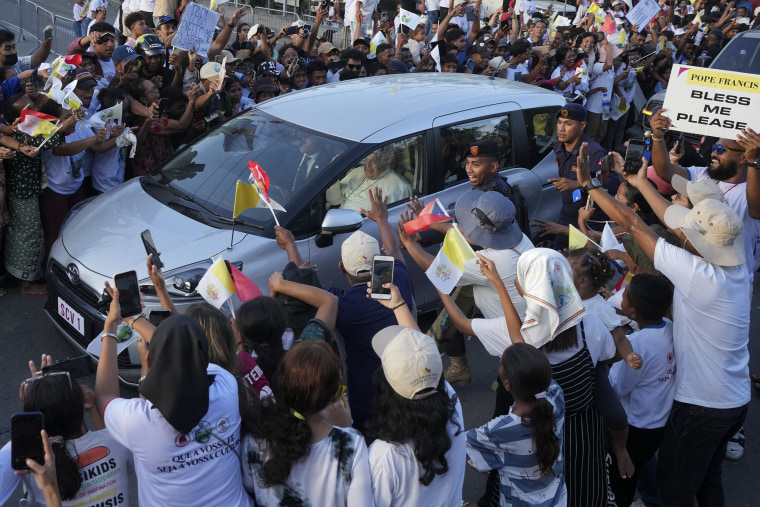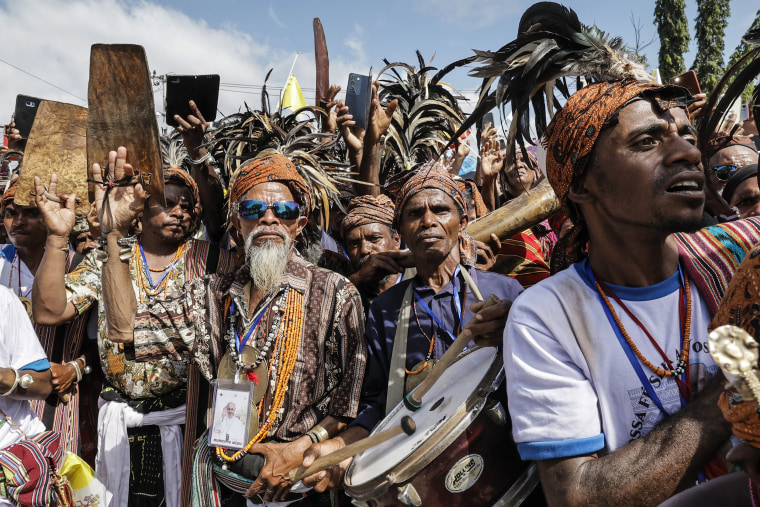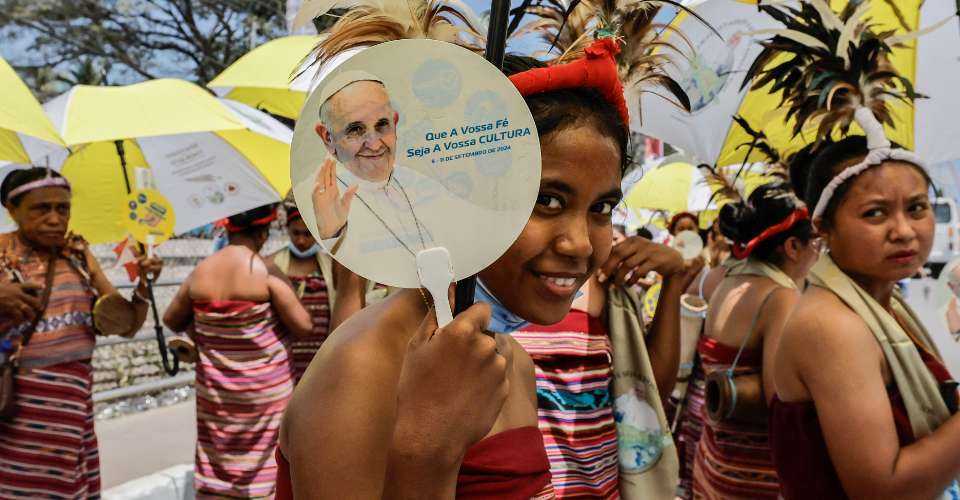Pope Francis was warmly welcomed by the people of East Timor on Monday as he arrived in the Southeast Asian nation to support its healing from a horrific and brutal independence struggle and to commemorate its progress following two decades of independence from Indonesian authority.
Waving Vatican and Timorese flags and carrying yellow and white umbrellas, the colors of the Holy See, to protect themselves from the sweltering noon sun, Timorese clogged Francis’ motorcade path into town from the airport.

They yelled, “Viva el Papa!” as he went by. His open-topped automobile once slowed down enough for him to bless a newborn that was brought to him in the middle of the throng.
The crowds of people, many of whom had T-shirts with Francis’ face on them, overwhelmed the few Timorese security officers stationed along the motorcade route and caused the convoy of vehicles and vans to slow to a crawl.
The 87-year-old Francis appeared to be delighted by the reception, grinning widely from the automobile and waving as he drove by many billboards with his picture and welcoming remarks.
Francis began the third phase of his journey through Southeast Asia and Oceania by arriving in Dili from Papua New Guinea. Francis was met at the airport by President Jose Ramos-Horta and Prime Minister Xanana Gusmao, two of East Timor’s most venerated independence heroes, who were having a private meeting.
Following a formal welcoming ceremony, the pope was scheduled to speak to diplomats and government representatives later on Monday.
Following the 25th anniversary of the U.N.-backed referendum that cleared the way for independence from Indonesia, the mostly Catholic nation of East Timor, one of the poorest in the world and the youngest in Asia, excitedly anticipated Francis’ presence.
Estevão Tei Fernandes, a university professor, stated, “Our great hope is that he may come to consolidate the fraternity, the national unity, peace, and development for this new country.”
Compared to the previous pope’s visit, the mood was very different. When St. John Paul II arrived in 1989, Timor was still striving to be liberated from Indonesian occupation.
Ten years later, following an overwhelming vote for independence by Timorese voters, Indonesia’s military launched a scorched-earth operation that startled the world and destroyed eighty percent of the nation’s infrastructure. Up to 200,000 people perished overall in the 24 years that Indonesia ruled the country.
John Paul’s visit, which concluded with a large Mass by the seashore close to Dili, contributed to raising awareness of the harsh nature of Indonesia’s occupation and the predicament of the Timorese people on a global scale.
According to Vicente Oliveira Soares, 42, who owns a digital printing company, “that was a different time.” “Now that we are free, we are happy.”
Francis will address the painful history of Timor as well as a more local one involving Bishop Carlos Ximenes Belo, a Timorese bishop who is revered as a hero for his attempts to achieve independence with Gusmao and Ramos-Horta.
Belo and Ramos-Horta shared the 1996 Nobel Peace Prize in recognition of their joint efforts to promote an equitable and nonviolent resolution to the conflict.

However, the Vatican admitted in 2022 that, two years prior, it had covertly approved Belo’s sexual abuse of young boys. The penalties forbade him from freely interacting with children or with East Timor itself, and they placed restrictions on his travels and ability to carry out his ministry. In 2021, the punishments were tightened.
Many in East Timor have supported Belo in spite of the penalties, which were validated last week before Francis’s visit by the Vatican spokesman and verified at the time. They have either discounted, denied, or downplayed the victims’ accusations. Some even hoped that Belo, a Portuguese resident, would be present to greet Francis.
Regarded as a hero for his part in the liberation struggle, American missionary Richard Daschbach, another priest, is incarcerated in a Timorese jail for twelve years after he molested underprivileged girls. The church defrocked him.
For his part, Ramos-Horta stated to The Associated Press last week that it was inappropriate to discuss the church’s crises again during Francis’ visit. Having the pope bring up the issue of abuse during his visit “would be like trying someone twice,” he told AP, adding that it was something the Vatican should handle.
In 1975, shortly after Portugal had abandoned East Timor as a colony, Indonesia invaded the country, with just around 20% of the population identifying as Catholic. With 1.3 million Catholics, East Timor is the largest Catholic nation outside of the Vatican, with almost 98% of its population practicing the faith today.
On Tuesday in particular, Francis will commemorate this legacy by celebrating Mass on the same waterfront promenade where John Paul said Mass in 1989 and inspired the Timorese people. Authorities anticipate that Tuesday’s Mass will draw some 700,000 attendees.






